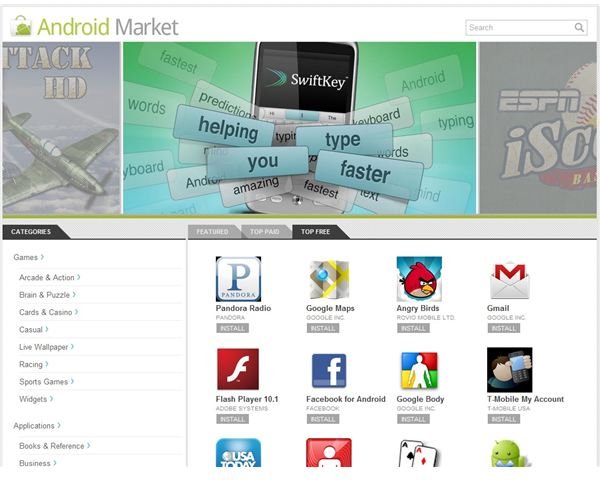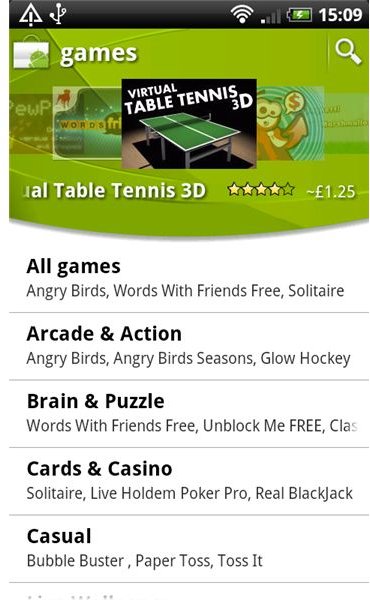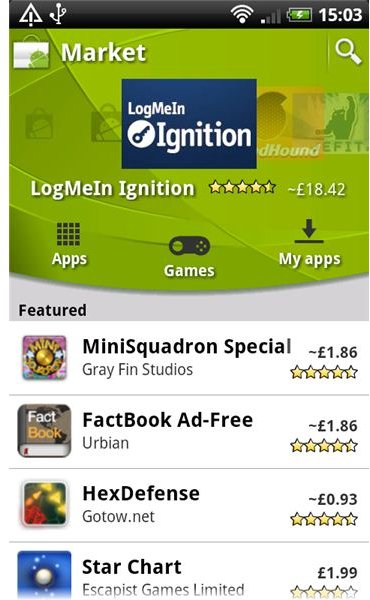How Many Android Apps Are Worth Downloading? How Do They Compare to iPhone Apps?
Some interesting research was recently conducted by Nielsen Smartphone Analytics and they found that the average Android user in the U.S. spends nearly an hour a day interacting with the web and apps on their phone. Apparently 67% of that time is spent on apps.
Even more interestingly the top 10 Android apps account for 43% of all time spent and the top 50 apps account for 61%. Considering the massive number of apps in the Android Market it’s pretty clear that a lot of them are not being used. To be honest that won’t be a huge surprise to anyone who has spent hours trawling through the copycats, sub-par garbage and plain awfulness that inhabits the Android Market.
Now don’t get me wrong, I’m a big fan of Android, but there are some obvious reasons why the bulk of the apps and games on offer are not worth downloading. In simple terms, it’s because they suck.
Think About Your App Usage
I don’t know about you (post a comment and tell me), but I would imagine my app usage is above average. I regularly try out new apps, often because I’m writing about them, but the number of apps that claim a permanent spot on my Android phone is very low.
I’ll play a game through and then delete it. There are a lot of apps that I’ll download for a specific purpose, but there’s no incentive to keep the app on your phone after you’ve used it – I can always delete it and then download it again if I ever need it. That leaves a core group that deal with music, reading, social media and photography because these are the main things I use my phone for. I don’t really find a need for more than one or two apps to cover all the bases in each area.
There is a decent range of information and functionality on offer in the Android Market, but there is also a glut of bad software. I also think there is a lack of innovation. Both of these factors have a range of causes so let’s take a look at them.
Quality Control

You’ll find a lot of Apple fans throwing this argument out. Basically Google allows anyone to publish anything in the Android Market. There is no quality control or submission process. If something is dangerous, criminal or bad enough they’ll generally remove it quite quickly, but there is no process to prevent it from being published in the first place.
On the one hand this conforms to Google’s ideal about having an open platform and it ensures that there are no barriers for developers. On the other hand it means people can publish some repugnantly awful apps and games.
In reality, the quality control is exercised and policed by users themselves through the rating system. If something has a one star rating then very few people are going to download it. Of course this system is open to abuse as people vote up their own apps and vote down competitors. You also have to feel sorry for the first few people who download a turkey to create those ratings in the first place.
The rating system also tends to create an upward or downward spiral. Some poor early ratings can sink an app forever, even if subsequent updates fix problems or dramatically improve an app it’s unlikely to get many downloads if it has a poor rating based on that first release. This can encourage developers to release an entirely new app instead of updating an old one and so the Market is further clogged with old unsupported software.
I think most people would like to see Google exercise a little more control over quality. However, if that could only come about by applying a submission fee then it wouldn’t be good for all developers.
Copy Cats
One of the major reasons for an overabundance of unused and unloved apps in the Android Market is duplication. There are far too many apps that basically do exactly the same thing. Photography is a good example of an area where there has been an explosion of apps, but loads of them offer exactly the same functionality.
For every innovator there are hundreds of copycats waiting in the wings to release sub-par versions of the same thing.
Fragmentation
Another major bone of contention for Android detractors is fragmentation. There are various versions of the Android platform out there and this means that some apps and games won’t work on some phones.
This is more of an issue for developers because they ideally have to support each version. Although the vast majority of users have 2.1 or above and end users shouldn’t really be able to access an app that isn’t supported on their phone. Still, there is no arguing that many developers do see it as a problem and it is a problem that you won’t encounter with an iPhone or a WP7 device.
Pricing
According to projections there either already are, or will soon be, more free Android apps than free iPhone apps. This means a much bigger proportion of Android apps are being released for free. Even the mega-popular Angry Birds game was released for free on Android with adverts, whereas it had a price tag on iPhone.
It’s not really clear whether developers are making a good return on in-app advertising and while you might think the dominance of free apps on Android is good for consumers, it certainly isn’t good for developers. In simple terms if developers can get a better return for their time and effort on other platforms then they’ll develop for them first. It makes sense to then port to other platforms and that’s exactly what happens, but a situation where the more polished apps in the Android Market are ports from iOS isn’t great for the platform.
It seems that Android users, on the whole (this is a generalization), are not as willing to pay for apps and games as iPhone users are.
Exposure

With a host of free tools and easy access to release your app on the Android Market it is probably easier to develop for Android, but how do you get your app noticed? While there are loads of poor apps out there, there are also some great releases that never got any recognition. If your release doesn’t hit a top ten chart then you’re stuck with the downward spiral into obscurity.
Is it easier to get noticed on other platforms? This is debatable. It certainly wasn’t easy on Android for a long time, but the improvements in the web version of the Android Market have definitely helped here. On the other hand if you are browsing casually then it will take you a long time to find anything other than the already top-rated apps.
The user rating system isn’t perfect. I thought the Editor’s Choice addition might be a way to highlight some new innovative apps and games, but in actual fact it highlights all the usual suspects and they really don’t need any more help to get noticed. If you want to find great new apps then websites that review them are currently your best bet.
Less Apps, More Quality
To answer the original question – yes, most Android apps are garbage, but so are most apps on other platforms. Does Android have a higher proportion of garbage? Unfortunately I think it does.
There’s no easy fix to this, but I think Google could definitely do more to protect quality and to highlight new and innovative apps and games from indie developers, instead of just the big name releases.
To be honest I think they could purge at least 50% of the content in the Android Market and it would actually improve the end-user experience, but then I could say the same thing about the App Store.
What do you think? Post a comment and let us know.
References
- Android Market, https://market.android.com/?hl=en
- Nielsen, http://blog.nielsen.com/nielsenwire/?p=28628
